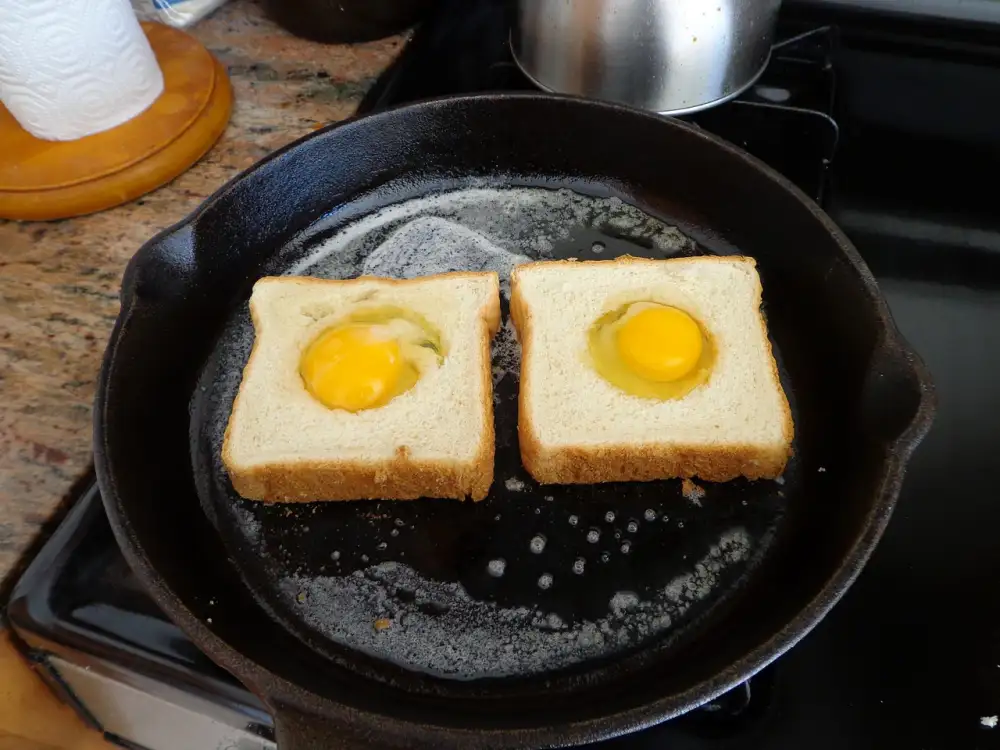Master the Art of Cleaning a Cast Iron Skillet: A Step-by-Step Guide

- Gather necessary materials: coarse salt, a sponge or scrub brush, dish soap, a towel, and vegetable oil.
- Rinse the skillet with hot water while it's still warm.
- Sprinkle coarse salt on the skillet's surface to act as a gentle abrasive.
- Use a sponge or scrub brush to scrub away any food residue.
- Rinse the skillet thoroughly with hot water and dry it completely with a towel.
- Apply a thin layer of vegetable oil to the skillet to prevent rusting.
- Store the skillet in a dry place to maintain its seasoning and prevent rust.
Gather necessary materials: coarse salt, a sponge or scrub brush, dish soap, a towel, and vegetable oil.
To master the art of cleaning a cast iron skillet, it's essential to gather the necessary materials beforehand. You will need coarse salt, which acts as a gentle abrasive to help remove food residue without damaging the skillet's seasoning. Additionally, have a sponge or scrub brush on hand to assist in scrubbing away any stubborn bits. Dish soap will be used sparingly to ensure thorough cleaning. A towel is necessary for drying the skillet completely after rinsing, and vegetable oil is crucial for preventing rusting by applying a thin protective layer post-cleaning.
Rinse the skillet with hot water while it's still warm.
After you finish cooking with your cast iron skillet, it's important to clean it properly to maintain its quality. One key step in this process is rinsing the skillet with hot water while it's still warm. This helps to loosen any food particles stuck to the surface and makes them easier to remove. The warmth of the skillet also aids in preventing any food residue from hardening, which can make cleaning more challenging. By rinsing with hot water promptly after use, you set yourself up for an easier cleaning process and help preserve the skillet for long-lasting use.
Sprinkle coarse salt on the skillet's surface to act as a gentle abrasive.
Sprinkling coarse salt on the surface of your cast iron skillet is a simple yet effective way to act as a gentle abrasive. The salt helps to loosen any stuck-on food particles without damaging the skillet's seasoning. As you sprinkle the salt over the skillet, you can use it in conjunction with a sponge or scrub brush to gently scrub away any stubborn residue. This method is particularly useful for removing tough stains or burnt-on food while preserving the integrity of your cast iron cookware.
Use a sponge or scrub brush to scrub away any food residue.
Once you have sprinkled coarse salt on the skillet's surface, it's time to tackle any stubborn food residue. Using a sponge or scrub brush, gently scrub away any remaining bits of food. Be sure to pay extra attention to areas where food may be stuck on more firmly. The coarse salt will continue to act as a gentle abrasive, helping to loosen and lift off any remaining residue without damaging the skillet's seasoning. Remember not to use steel wool or harsh abrasives that can strip away the skillet's seasoning.
Rinse the skillet thoroughly with hot water and dry it completely with a towel.
After scrubbing away any food residue with the salt and sponge, it's essential to rinse the skillet thoroughly with hot water. This step helps to remove any remaining salt and food particles from the surface of the cast iron. Once rinsed, dry the skillet completely with a towel to prevent any water from sitting on the surface and causing rust. Proper drying is crucial in maintaining the integrity of your cast iron skillet and preventing any potential damage.
Apply a thin layer of vegetable oil to the skillet to prevent rusting.
After drying the skillet completely, it's crucial to apply a thin layer of vegetable oil to prevent rusting. The oil acts as a protective barrier against moisture in the air that can cause rust to form on the cast iron surface. Simply pour a small amount of vegetable oil onto a paper towel and rub it all over the skillet, including the inside, outside, and handle. Make sure to coat the entire surface evenly but avoid applying too much oil as it can become sticky or rancid over time. This step helps maintain the skillet's seasoning and prolong its lifespan for years to come.
Store the skillet in a dry place to maintain its seasoning and prevent rust.
After cleaning and oiling your cast iron skillet, it's crucial to store it properly to maintain its seasoning and prevent rust. Store the skillet in a dry place away from moisture to avoid any chance of rust forming. Avoid stacking other items on top of the skillet as this can trap moisture and lead to rust. If you must stack your cast iron cookware, place a paper towel or cloth between each piece to allow for air circulation. By storing your skillet in a dry environment, you'll ensure that it remains in excellent condition for years to come.
Published: 23. 03. 2024
Category: Home



